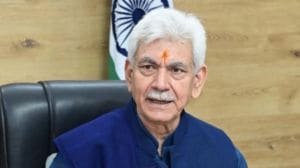Anti-war to anti-dress codes: The many protests at Cannes over the years
A woman dressed in the colours of the Ukraine flag poured fake blood on herself at the Cannes red carpet. Cannes has been the site of many expressions of dissent. Here are some of the most well-known.
 Ilona Chernobai was whisked away immediately, but not before she had made her point in support of Ukraine. (Via Instagram.com/ilonachernobai)
Ilona Chernobai was whisked away immediately, but not before she had made her point in support of Ukraine. (Via Instagram.com/ilonachernobai) When she stepped onto the red carpet in a gown in Ukrainian colours at the 76th annual Cannes Film Festival, there was nothing that particularly distinguished Ilona Chernobai, a model and fitness influencer from Ukraine. That is until she poured some fake blood on herself to register a dramatic protest against the ongoing Russia-Ukraine war. She was whisked away immediately, but not before she had made her point in support of the occupied territories of her country.
Chernobai’s expression of dissent might have been unique but this is not the first time that the Cannes film festival has seen protests. Over the years, it has been the site of many expressions of dissent. Here are some of the most well-known among them:
The New Wave shutdown of 1968
In May 1968, a call for a morning press conference at Cannes would lead to an unexpected turn of events in the festival’s show of glamour. French New Wave cinema behemoths Jean-Luc Godard and François Truffaut announced their solidarity with the student protests that had been rocking France since March that year. Just about a week earlier, a march of nearly 30,000 students had led to violent clashes with the police in Paris’s Latin Quarter.
The Night of the Barricades, as it came to be known, had pushed the filmmakers to form the Cinematheque Defence Committee and come out in support of the protestors. “The radio announces by the hour that factories are occupied or closed. The trains have stopped, and the metro and buses will be next. So to announce every hour that the Cannes Film Festival continues is just ridiculous,” said Truffaut.
Godard was more direct: “We’re talking solidarity with students and workers, and you’re talking about dolly shots and close-ups. You’re ass***es,” he said. Commenting on how none of the films at the festival nor its over-the-top show of wealth were representative of what was going on in France, Truffaut asked for a closure to that year’s festival. “Everything with any sort of dignity or importance in France has come to a stop. I propose that we bring Cannesto a halt to organise a debate about the future of French cinema.”
Many of his colleagues agreed and it was an unceremonious closure to Cannes 1968.
View this post on Instagram
Shutters Down in 1975
If there aren’t a thousand shutters going off as the stars step on to the red carpet, is it even a festival? At the 1975 Cannes Film Festival, American actor Paul Newman would discover to his peril what it meant to snub photographers. When he refused to pose for them soon after arrival, the photographers retaliated by putting their cameras down and refusing to click him when he climbed the famous steps of the Palais in the evening. The matter would be sorted the next day after Newman tendered an apology.
French actor Isabelle Adjani also met with a similar fate in 1983 before the screening of her film, L’ete Meurtrier, when she refused to be photographed by anyone other than a few select photographers with whom she had entered into exclusive contract for photography rights.
Rocking the dress-code boat in 1991
Pop icon Madonna came dressed to dissent in 1991 when she broke the festival’s formal dress code of below-the-knee evening dresses by appearing in a long pink satin cloak that she took off on the steps of the Palais to reveal a ’40s-inspired two-piece bustier outfit by upcoming designer Jean Paul Gautier.
Protesting against the fashion police
Rigid sartorial demands at the festival would again come under fire in 2015, when a news story reported how women wearing flat shoes were being turned away from the festival. While the festival confirmed that the dress code for women mandated high heels, it refused to comment on the report.
Next year, actor Julia Roberts would walk the red carpet barefoot, as would actor Sasha Lane. The matter would again come up three years later when Kristen Stewart would take off her Louboutins and walk the 2018 red carpet barefoot, ahead of the screening of the film BlacKkKlansman.
At this year’s festival, too, at the screening of Bread and Roses, actor Jennifer Lawrence paired her red Dior gown with black flip flops. Cate Blanchett took her heels off before presenting Iranian French actor Zahra Amir Ebrahimi the Breakthrough Artist award in solidarity with Iranian women’s fight for civil rights.
Stop the war, heal the world: The Russia-Ukraine war at Cannes 2022
A year before Chernobai’s protest, at the 75th Cannes Film Festival, the Russia-Ukraine war again came under the spotlight when artistes expressed their solidarity with Ukraine against Russian invasion.
Producers Darya Bassel and Yelizaveta Smith wore t-shirts that had the image of an explosion on it, with the message: “Sensitive content: Russians kill Ukrainians. Do you find it offensive and disturbing to talk about this genocide?” accompanying it. Also, a woman took off her clothes on the red carpet to reveal the Ukrainian flag painted on her body, with a short, stark message: ‘Stop raping us.’






- 01
- 02
- 03
- 04
- 05
































